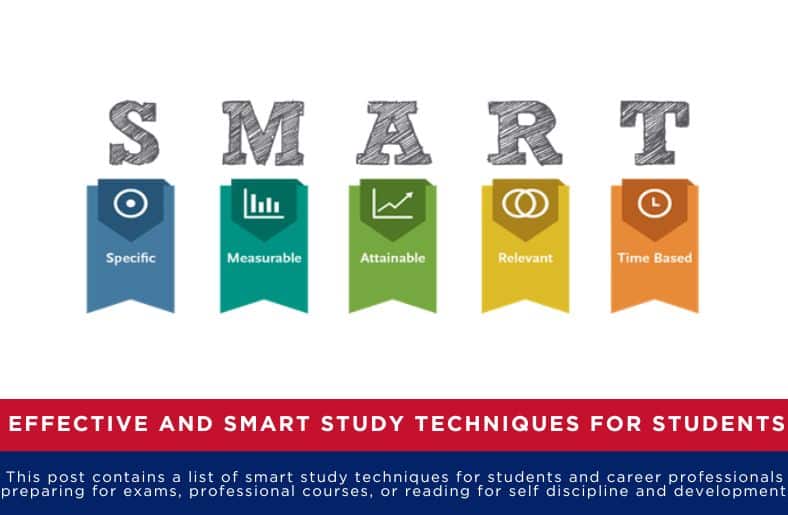What are the smart study techniques that work at any level?
Preparing for examinations, most especially professional courses, requires effective and smart study techniques for students, professionals, and casual readers.
Get Realtime Updates from Scholars World on Google News (Follow us)
It is widely believed that success comes from being persistent on something.
However, the concept of being persistent as it relates to studying does not translate to studying more than 12 hours a day, reading a text that could have just taken some hours a day.
The reality is that: It is not how far, but how well, and the only hack is to study smart!
How do I study smarter? Does studying smart relate to ignoring useful information in a
textbook?
Worry less, I will be unveiling secrets to studying smart, whether you are a student or a
professional preparing for promotional examination, to clear your wandering minds.
This article is packed with necessary techniques and real-world strategies to help you learn
faster, retain more without jeopardizing your mental health.
Join the Scholars World community on X (Twitter) to explore the world of opportunities!
What are Study Smart Techniques?
Smart study techniques include a myriad of techniques and strategies to gain the required knowledge within a short period, compared to studying for longer periods and having sleepless nights.
Studying smart focuses more on productivity, increased knowledge retention, and active learning to achieve better results and learning outcomes.
We will talk about some of the importance of studying smart in the following paragraphs. Read on!
Studying Smart vs Studying Hard
Should you study hard for long hours or study smart using tested and trusted strategies?
Here is a comparison of the benefits of studying smart and studying hard. We will leave you to make your own inferences and decide which to adopt.
- Retention Ability: While studying smart improves the comprehension ability of the reader, studying hard tends to encourage cramming and memorization. Thus, smart study techniques encourage more retentive capacity for students.
- Time of Study: Studying hard requires long hours of dedicated reading and re-reading, which may affect the ability to focus. Studying smart, however, promotes 2-4 hours of focused sessions that enable adequate assimilation and prevent fatigue.
- Productivity: Smart study strategies target high-yield and relevant topics during the focused sessions, and not everything at once, as in the case of hard study.
Studying Smart vs. Studying Hard
| Studying Smart | Studying Hard |
|---|---|
| Focuses on understanding | Focuses on memorization |
| Uses active recall & spaced repetition | Reread notes repeatedly |
| 2-4 hours of focused sessions | 8+ hours of unfocused cramming |
| Targets high-yield topics | Covers everything at once |
| Less stress, better retention | Burnout, quick forgetting |
Benefits of Smart Study Techniques for Students
Studying smart not only saves you time but also equips you with proper time management in handling other activities.
Smart study techniques and strategies give you good health management and enhance your ability to gain mastery of things within a short period.
These techniques range from Pomodoro, Feynman, Active Learning, and Spaced-Repetition. We will provide exegesis of these techniques in subsequent paragraphs below.
1. Study yourself, understand your learning style:
Individuals differ in the methods of committing information to the brain and getting it stored in long-term memory.
There are 4 basic ways of learning:
- Visual: understanding concept through colors, diagrams, and chart presentation.
- Auditory: understanding concepts by listening to audio records, podcasts of the information.
- Reading/writing: some commit information to the brain by reading while writing notes, jotting, or summarizing notes.
- Kinesthetic: when the rate at which you retain information is based on what you see as actions, put into practice, or emulate.
2. Use the Pomodoro technique:
“All work and no play makes Jack a dull boy.” This also applies to the brain.
The Pomodoro technique is a simple method that comprises:
- 25 minutes of focused work
- 5-minute breaks
- Then, after 4 rounds, a 15-30 minute break.
The brain is focused only for a shorter period, taking breaks will not only relieve the brain of
load stress, but also prevent burnout and keep yourself refreshed and reenergized.
Explore more scholarship opportunities below.
3. Implement active recall and timed repetition:
Active recall is the process of testing the brain by trying to recall the information without looking at the text. This helps you know the level of assimilation of the information.
Timed repetition is the process of rechecking the material over timed intervals, such as 5 hours, 12 hours, 1 day, etc. This will fill the space of forgotten information and allow proper storage of the information.
4. Take smart notes only
Every information has its own key point, taking notes of key points in information reduces the stress of going through several pages explaining a key point.
5. The Feynman Technique
This is the process of explaining a concept in your own words as well as you can. Try to put down words the way you understand them; it helps in critical thinking and understanding of the concept.
6. Minimize distractions
If possible, block and do away with all kinds of distractions, even if it’s a text message or most especially the phone.
Switching between tasks reduces the focus ability of the brain and kills productivity over time.
This can be done by:
- turning off notifications or switching on airplane mode, or better, switching off the phone if not needed for study.
- creating a well-lit, distraction-free, and noise-free environment that is conducive to studying.
7. Explore online learning tools
The use of online tools in learning should not be underestimated, as additional information about a topic can be obtained from educational videos, websites, apps, and even courses.
Apps such as YouTube contain free educational videos and courses, sites such as Google Scholar and Khan Academy also offer free educational information; however, paid courses can also be bought, as it has premium content that cannot be found in free courses.
8. Teach someone else
A secret hack to test and at the same time improve your level of understanding is by teaching a concept to someone else. It helps you realize your level of understanding and gain more insight while explaining it.
9. Prioritize sleep, proper nutrition, and regular exercise
Sleep health and our minds play a major role in our well-being. Prioritizing sleep, for at least 6 hours daily, consolidates memory, eating nutritious food, especially brain-boosting foods (eg, nuts, wholegrains, greens) aids the brain in getting the required energy to retain information.
Light but regular exercise, such as walking, some meters, push-ups, prepares the mind and increases brain activity.
10. Plan ahead, break big tasks into smaller ones
For productivity purposes, planning and studying ahead saves time. When you plan your study schedule and attach a deadline, you remain focused till the end to achieve the desired goal.
“Being overwhelmed is a productivity killer”. Break your tasks into smaller but realistic steps with deadlines.
11. Reflect and improve, test your knowledge
After each study, reflecting on what you have learnt would go a long way in contributing to continuous improvement.
Taking practice tests, quizzes, exploring topic-based test apps, and engaging in brainstorming sessions aids good retention of knowledge.
READ ALSO
Conclusion
Studying smart gives you an edge over others while getting yourself engaged in other activities. It makes you more productive by managing your time and being critical in thinking.
FAQs
- Does studying hard take time than studying smart?
Yes, but it depends on the individual. Some study hard and smart, thereby saving time.
- Apart from time management, what other benefits are there to studying smart?
Other benefits of studying smart include critical thinking skills and balanced health while studying.
- For more scholarship updates, Click HERE.
- Google: Scholars World Updates
- Phone: +234 913 731 7629 (Whatsapp only)
- Email: contact@scholarsworld.ng
- Facebook: facebook.com/ngscholarsworld
- Twitter: twitter.com/ngscholarsworld
- Telegram: t.co/ngscholarsworld






















